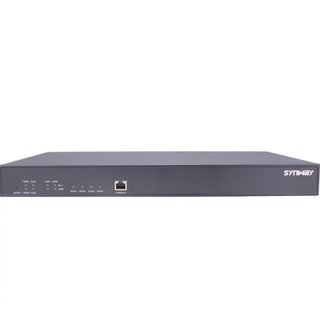What does PBX Switchboard mean?
PBX (Private Branch Exchange) Switchboard is a telephone exchange system that allows creating a private telephone network. It is generally used by medium and large-sized businesses, institutions or organizations. PBX Switchboard is used to manage internal (inside the company) and external (outside the company) phone calls. Internal calls are free between phones within the switchboard. For external calls, you usually connect to a service provider.
An indoor wireless telephone switchboard is a solution that integrates cordless phones and a PBX system. In this way, employees can receive and make internal or external calls even while moving around the workplace. Cordless phones generally use wireless technologies such as Wi-Fi or DECT (Wireless dect switchboard solutions).
This type of system can provide a number of features and functionalities such as:
- Call Forwarding: Directing incoming calls to a specific department or person.
- Auto Attendant: Creating an automatic voice response system (IVR) that takes the call.
- Call Waiting and Music: Listen to music or informative messages while waiting for calls.
- Multiple Line Usage: Creating multiple external lines and extension lines.
- Conference Calls: Allowing multiple people to be on the same call.
- Call Recording: Recording calls.
- VoIP Support: Ability to make voice calls over the internet.
PBX systems can be hardware-based or software-based (such as IP PBX). Hardware-based systems are usually located in a physical location, while software-based systems are usually hosted on a server or cloud service.
What is a Wireless Telephone Transmitter Called?
In cordless telephone systems , the transmitter is often called a "base station" or "charger". This station is the unit through which the cordless phone communicates wirelessly, charges, and generally controls the phone's main features. The base station creates an interconnection between the wireless phone and the telephone line and allows the wireless phone to move around the home or office.
The base station is usually connected to an electrical source and is usually connected to the telephone line (analog or digital). Base stations are designed to cover a certain range, which means the cordless phone can move within that range.
It is important to remember that such systems operate on radio frequencies and these frequencies are subject to different regulations from country to country.
What is the Radio Range?
DECT phones are generally designed for home and office use and therefore their radio range may vary depending on a variety of factors. However, a typical DECT phone may have a range of approximately 50 meters to 100 meters indoors (such as a home or office). In open areas, this range can theoretically go up to 300 meters.
These ranges are valid under ideal conditions. This means that these ranges can be achieved if there are no obstacles (walls, ceilings, etc.) or radio frequency interference in the signal path. However, in most real-world scenarios, such obstacles and interference can significantly limit range.
Some DECT phones may offer the ability to increase range by using additional base stations or repeaters. These additional devices receive the main base station's signal and re-radiate it to spread over a wider area. However, such expansion often introduces additional cost and complexity.
It should be noted that the DECT standard can operate in different frequency bands in many countries, so the range of a DECT phone may also vary depending on legal regulations.
Which is the Best IP Switchboard?
What is the best IP PBX system can often vary depending on your specific need, budget, technical capabilities and business model. However, some widely accepted and industry standard IP switchboard systems are listed below:
- Synway : Synway is a company specializing in VoIP and communications solutions. Products such as Synway UC500-100 IP PBX Switchboard are specifically designed for stability and high performance. It has high scalability and integration capability, making it ideal for growing businesses.
- Asterisk : It is an open source and highly flexible system. It is generally preferred for small and medium-sized businesses, but may require technical knowledge.
- Cisco Unified Communications Manager : It is a system designed for large institutions and complex communication needs. It has high security and multiple features, but the cost can be high.
- Avaya IP Office : User-friendly and offers a wide range of features. It is generally preferred by medium-sized businesses.
- 3CX : It attracts attention with its ease of use and affordable cost. It also has a cloud-based version.
- Mitel MiVoice : Designed specifically for mobile and remote workers, it offers numerous customization options.
- Microsoft Teams : Offers a wide range of communications, including VoIP and video conferencing systems . Its integration with Microsoft's other products is very good.
Each has its own pros and cons, and the best choice depends on the specific needs of your business. Additionally, factors such as local regulations, support and service guarantees may also play a role in the decision-making process.
What to Consider When Buying an IP Switchboard?
Technicial Specifications
- Scalability : It is important that the system can easily grow as your business grows.
- Security : It is necessary to have security features such as strong encryption and authentication.
- Voice Quality : HD voice quality and advanced voice codecs are important for clear and understandable communication.
Functionality
- Call Forwarding and IVR : These types of features provide a professional customer service experience.
- Conferencing and Video Conferencing : It may be useful to support multiple conference calls.
- Mobile Compatibility : Compatibility with mobile devices provides a flexible working environment.
availability
- User-Friendly Interface : An easy-to-use system reduces time and training costs.
- Setup and Management : A simple and quick installation process is preferred.
- Support and Training : Having reliable customer support and training materials provides quick solutions to any problems that may be encountered.
Cost
- Installation and Hardware Costs: Consider how much of an initial investment you need to make.
- Operating Cost: Check how much you have to pay per month and if there are any additional licensing or feature costs.
Compatibility and Integration
- Compatibility with Existing Systems : Compatibility with existing phone systems, CRM software, or other business applications may be important.
- Technological Standards : Supporting industry standards such as SIP and VoIP is important for future compatibility.
Reliability and Support
- SLA (Service Level Agreement) : Pay attention to whether there is a guarantee regarding the quality and reliability of the service provided.
- Manufacturer and Provider Reputation : References and customer reviews can give an idea about the reliability of the manufacturer.
These factors can help you evaluate how suitable the IP switchboard system you are considering is suitable for your business needs.
< Kısalt
What does PBX Switchboard mean?
PBX (Private Branch Exchange) Switchboard is a telephone exchange system that allows creating a private telephone net... Devamını Gör >
You’re viewing 1-1 of 1 products


